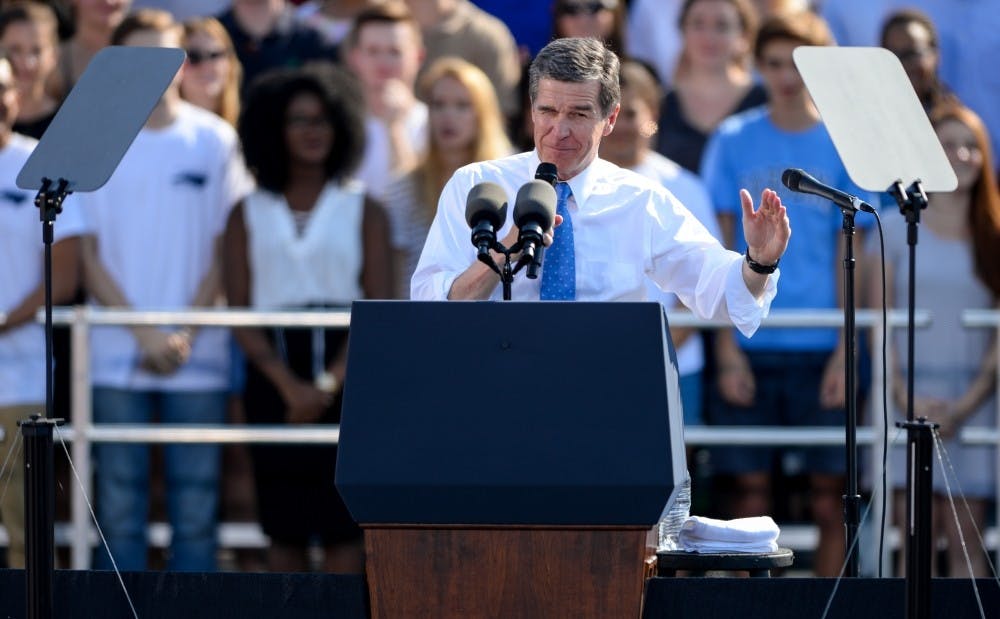While Duke students are wrapping up the semester and awaiting final grades, Gov. Roy Cooper is getting the first report card of his young term—the 100 day check-in.
Cooper, who was sworn in Jan. 1 this year, is no stranger to Raleigh and the state government. The experienced legislator and former state attorney general has addressed a variety of issues during his time in office, including lawsuits on the extent of his executive powers that marked his first weeks in power. More recently, Cooper has been in the spotlight for his actions regarding the controversial House Bill 2.
“There are a couple of things that come to mind when I think of his first 100 days, but the main one is House Bill 142,” said first-year Leah Abrams, referring to the recent compromise bill that made the news for modifying the original HB2.
Abrams—the director of communications for Duke Democrats and a columnist for The Chronicle—phone-banked and canvassed for Cooper during his 2016 election campaign. She said, however, that she would summarize Cooper’s first 100 days as “disappointing” because of his decision to go forward with the compromise.
“A progressive blue state had to fight to put a Democrat in the governor’s office, and they fought because they were expecting that there would be a full repeal of [HB2]—not just something to appease businesses, but a full repeal that would protect minorities in the state,” Abrams said. “Obviously, that did not happen.”
Although HB142 does roll back significant portions of HB2, it still prohibits local governments from crafting their own nondiscrimination ordinances until December 2020. For Democrat Mike Woodard, a state representative from Durham and Trinity ’81, this aspect of HB142 influenced his decision to oppose it.
The compromise was struck in the shadow of a deadline imposed by the NCAA regarding its decision to allow sporting events back in the state, Woodard explained. The NCAA is now actively considering bringing events back to North Carolina.
“The governor was convinced that it was the best deal he thought he could get at that time,” Woodard said. “We were clearly feeling the pressure of the NCAA decision on allowing games back in.”
Junior Colin Duffy, president of Duke College Republicans, wrote in an email that he found HB142 to be a successful compromise. He noted that constituents should not "vindicate their representatives for working with the other side."
"You know it is a fair and reasonable solution to the issue when both the far right and far left are not happy with the outcome," he wrote.
Like Abrams, Durham City Councilman Steve Schewel dubbed the compromise “disappointing.”
Despite that, Schewel—who is also a visiting assistant professor in the Sanford School of Public Policy—said that he found Cooper’s term to be off to a solid start. He noted that Cooper’s efforts on Medicaid and his cabinet appointees have been some of the highlights of his young governorship.
One of Cooper’s most lauded policy initiatives has been his push for educational funding. Abrams praised Cooper's inclusion of a teacher pay increase in his proposed budget.
“No matter your party, education is important,” she said. “Compensating teachers fairly so that they will stay here is part of that.”
Schewel—who previously served on the Durham Public Schools' Board of Education for four years—similarly stressed the value of Cooper’s stance on education. He explained that it was “critically important” to ensure good schooling for children.
Duffy also expressed enthusiasm for Cooper's focus on education, arguing that some of Cooper's stances were influenced by the administration of former Republican Gov. Pat McCrory.
"Cooper is essentially mirroring what McCrory and the [State General] Assembly had in mind all along when he was in power," he wrote. "Education is paramount to NC growth. Sometimes however, the solution isn’t always spending more money, but spending the existing allocation more wisely."
Schewel acknowledged that the governor’s powers are limited due to the veto-proof supermajorities of Republicans in both chambers of the General Assembly. But he also said that there “are a lot of things that he will be able to do.”
Woodard agreed, explaining that having Cooper as an executive check on the Republican-dominated legislature could improve the quality of state legislation.
“He’s clearly going to dig in his heels and fight for those things that he values," Woodard said. "With maybe two or three exceptions, Gov. McCrory just rubberstamped everything that the General Assembly sent to him. Gov. Cooper is not going to do that.”
As a whole, Schewel and Abrams said that they were disappointed in the HB2 compromise but thought Cooper had shown promise in other ways. Woodard also said he had a very positive view of the new administration’s early litmus test.
“His first 100 days, I think, has been really strong,” Woodard said.
Get The Chronicle straight to your inbox
Signup for our weekly newsletter. Cancel at any time.
Bre is a senior political science major from South Carolina, and she is the current video editor, special projects editor and recruitment chair for The Chronicle. She is also an associate photography editor and an investigations editor. Previously, she was the editor-in-chief and local and national news department head.
Twitter: @brebradham
Email: breanna.bradham@duke.edu

